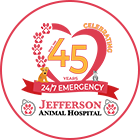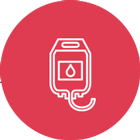One of the staff Veterinarians at Jefferson Animal Hospital Fern Creek sat down to answer some questions about what it’s been like to navigate the Covid-19 pandemic as a Veterinarian. Want to know what it’s been like for her & have some pet related questions about Covid-19? Here’s Part One of what she had to say.
-What’s been the biggest challenge at work?
I hope our clients know how much we miss seeing them face to face in the exam room!
- The biggest challenge for me, personally, is having to deliver difficult news and help owners choices without being face to face. Having gone through really hard times with my own pets in the past, I know just how tough it can be to hear bad news. As a veterinarian, my first priority is always the well being of my animal patients. But we also are acutely aware that those animals have owners who love them dearly like members of their own human family. It is a challenge maintaining distance in times when I most want to express sympathy and empathy in person.
- The second biggest challenge has been finding creative and alternative ways (often involving telemedicine services) to deal with sick or injured pets in our Low Stress Handling Program. These patients are often quite anxious, and we often need the clients present as part of the protocol that works for those patients in the veterinary clinic setting – so not having the ability to allow clients in the clinic right now makes managing those cases a special challenge.
-What’s been the biggest change?
I know we’ve mentioned Telemedicine a lot so far, but it really is a pretty significant change in how we manage cases during these difficult times. This is very new to our clinic!!
-What’s the biggest surprise?
That Telemedicine has gone so smoothly and efficiently! I am not a tech savvy person (which is why I am a veterinarian and not a computer engineer or social media director!) but our supervisors and technicians have everything set up and ready to go for our clients using this service and it is going very well.
We have also been pleasantly surprised and so thankful of how understanding the majority of our clients have been about the recent new protocols we have in place during this pandemic. I was worried initially about how people would take it – not being able to be physically present in the clinic with their pets – but most people are just grateful that we have remained open and available to treat their sick babies!
-Is telemedicine something that you feel we should continue to use?
I think there is definitely a place for telemedicine in veterinary medicine, but that it should be used judiciously and with great caution:
Would it be helpful for a high stress patient with veterinary anxiety who has a small superficial wound or a small rash that I may be able to assist with via video communication to avoid a stressful trip in the car or to the vet office? YES.
But what about a patient with coughing or labored breathing – a patient for whom I really need to listen to the chest with a stethoscope and likely get some chest x-rays? NO.
So there are limitations to what can be done without a physcial exam and diagnostic tests.
-What is the biggest message you would want to send to our clients?
We understand that this is a highly emotional time. Not only are people worried about their sick pets – who for many are considered equal in status to human family members – but in addition people are worried about when they can go back to work, how to pay the bills, how to keep up with their children’s education, or how to care for an elderly relative without posing a significant risk to them.
We hope that treating your pets can take one worry off the list.
We want you to know that we are here for you and yours – pure and simple.
Please let us know how we can help.
-For clients, what can wait? What can’t?
- Routine wellness exams, vaccines, and grooming procedures such as toenail trims can wait. Routine annual bloodwork screening in pets that are not ill or do not have chronic illness we are monitoring can wait.
- Some minor conditions may be addressed via phone consultation or video telemedicine consultation with a veterinarian. This may include small minor/superficial wounds, skin or ear infections, a new lump that has popped up on the body, etc.
- Severe gastrointestinal symptoms, coughing or labored breathing, eye problems, and painful conditions should be seen in the clinic by a veterinarian.
- We encourage clients to call our office and speak with a receptionist or a veterinary nurse if they are not sure whether their pet needs to be seen, and whether in person or telemedicine services are appropriate.
- Clients may also call to forward book their previously postponed routine wellness and vaccine visits.
-Can I get the Corona Virus from my pet?
There is no evidence to suggest that animals, including pets, that may be incidentally infected by humans are playing a role in the spread of COVID-19. Human outbreaks are driven by person-to-person transmission.
Pets have other types of coronaviruses that can cause them to become ill, but these are species-specific, meaning that they do not infect people and are not related to the current COVID-19 outbreak.
We will continue to provide you with information as we learn more about pets and SARS-COV-2. Because animals can spread other diseases to people and people can also spread diseases to animals, it’s a good idea to always wash your hands before and after interacting with and caring for your pets, as well as before and after handling their food, supplies, and pet waste.
-Is it safe to walk my dog? What should I do/not do during that walk?
According to the AVMA: “Taking a walk helps support you and your dog’s good health, and can contribute to wellbeing for both of you. To observe social distancing, keep space of at least 6 feet between yourself and others who do not live in your home, do not gather in groups, and stay out of crowded areas. Dogs should be walked in the neighborhood in a way that allows for social distancing and keeps them safe. Avoid dog parks (many are currently closed) and other public places where groups of people and dogs may gather. To help maintain social distancing, do not let other people pet your dog when you are out for a walk.”
While risk of transfer of SARS-CoV-2 from collars, leashes, and carriers also appears to be limited, it’s always a good idea to keep pet collars, leashes, and carriers clean and, fortunately, the SARS-CoV-2 virus is susceptible to routine cleaning. The Environmental Protection Agency has published a list of wipes, ready-to-use, and dilutable products for use against SARS-CoV-2.
-I think my pet has symptoms – should I have my pet tested for the virus?
There is no current evidence to suggest that animals, including pets, that may be incidentally infected by humans are playing a role in the spread of COVID-19. As such, routine testing of animals for COVID-19 is not recommended by the AVMA, CDC, USDA, American Association of Veterinary Laboratory Diagnosticians (AAVLD), or National Association of State Public Health Veterinarians (NASPHV).
Current expert understanding is that SARS-CoV-2 is primarily transmitted person-to-person. At this time, there is no evidence that animals play a significant role in spreading SARS-CoV-2. And, based on the limited data available, the risk of animals spreading COVID-19 to people is considered to be low. If an animal becomes ill with respiratory or gastrointestinal signs, your veterinarian will first test for more common pathogens and conditions that are more likely to have caused such clinical signs. Animal testing for SARS-CoV-2 is available if the attending veterinarian and local, state, and/or federal public health and animal health officials agree an animal merits testing.
Answers to frequently asked questions about animal testing are available from USDA (state public and animal health officials and public), CDC, and AVMA (veterinarians and public), and can be found here.
Anything else you want to share?
We are already approved to start forward booking routine wellness appointments and procedures again (as long as we adhere to the social distancing guidelines and expectation to conserve PPE as much as possible as outlined by the order from the governor).
This means we can start seeing your pet again for annual checkups, vaccines, toenail trims, and spay and neuter procedures very soon!
Please call to forward book your pet’s routine wellness visit today so we can save you a spot!





